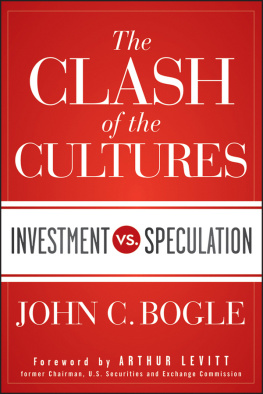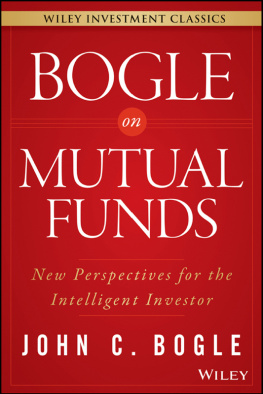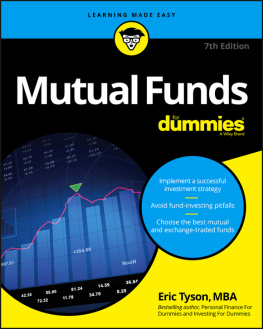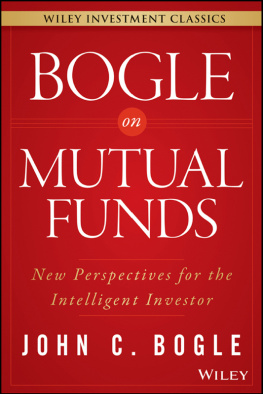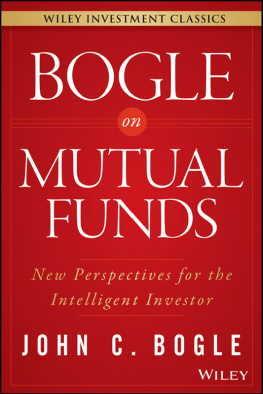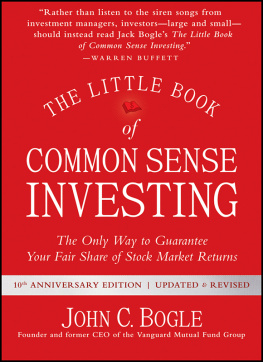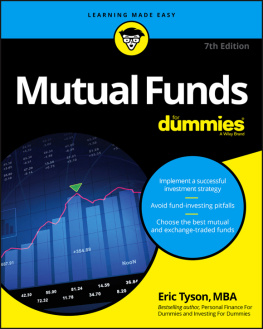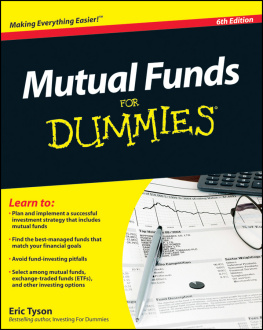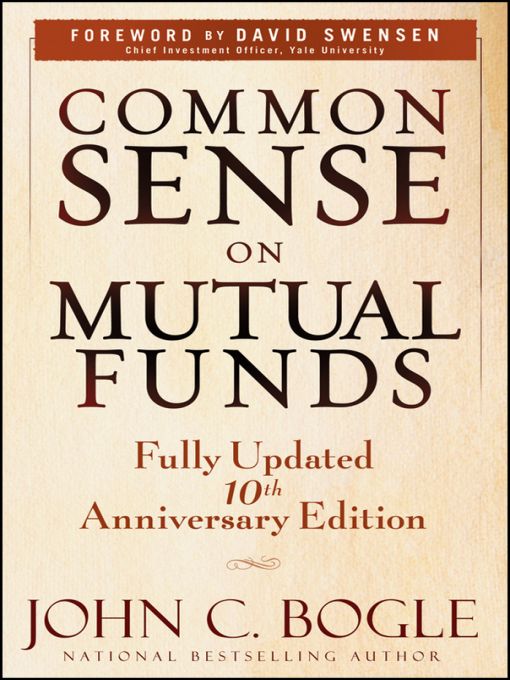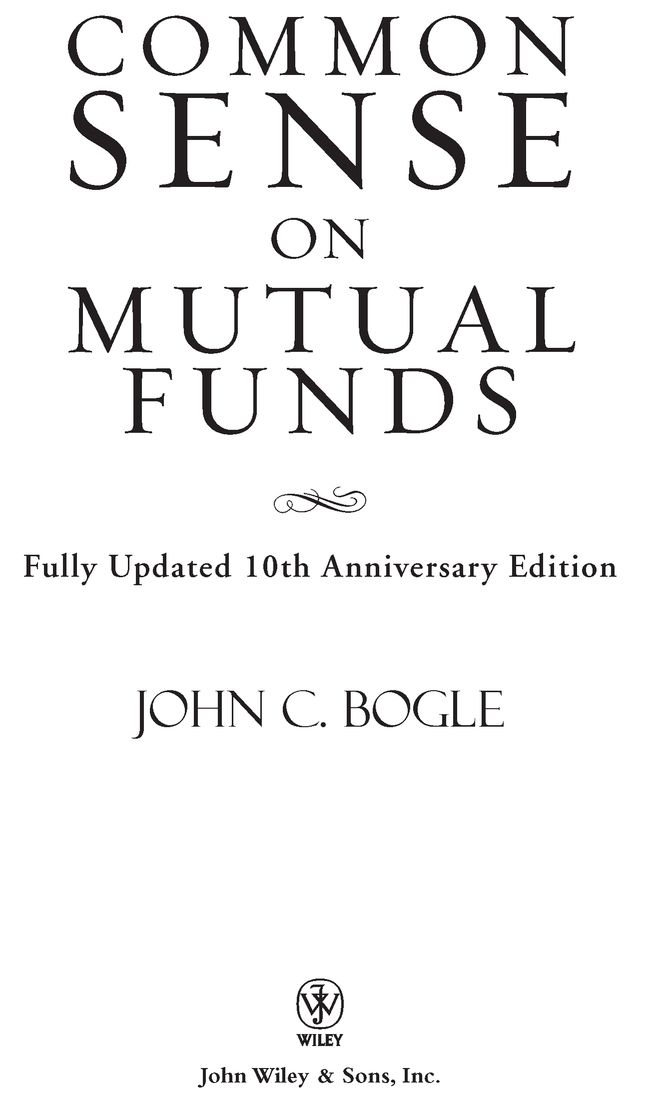Table of Contents
Praise for the original edition of
Common Sense on Mutual Funds
Cogent, honest, and hard-hittinga must-read for every investor. Bogle does the American investor a real service by carrying on his crusade. Absolutely terrific, particularly Part IV, On Fund Management. I hope some journalists and the SEC get energized after reading it.
Warren E. Buffett
Praise for the tenth anniversary edition of
Common Sense on Mutual Funds
Jack Bogle gave the public two magnificent giftsVanguard... and Common Sense on Mutual Funds, a readily accessible guide on how to manage personal investment portfolios. Take advantage of Jack Bogles gifts and pass them on to someone you love.
David F. Swensen, Chief Investment Officer, Yale University
We dont know who first invented the wheel. But the one and only inventor
of the first index mutual fundbroadly diversified and investor-friendlywas
John Bogle. If you will read only one book on canny personal investing, dont
pick Warren Buffetts valuable offering. Buffett cannot make you or me a Warren
Buffett. By contrast, John Bogle can help make any of us a canny investor who
minimizes wasteful turnover and unuseful selling loads. The only thing better than
Bogles original book is its improved revision. Bon appetit!
Paul A. Samuelson, Nobel Laureate, Economics;
Massachusetts Institute of Technology Professor, Emeritus;
Professor of Economics, Emeritus; Gordon Y. Billard Fellow
Were I allowed to recommend only one investment volume to friends and family, the updated edition of Common Sense on Mutual Funds would be it; in no other single place can you so easily, and enjoyably, acquire the expertise and perspective necessary to harness the vast power of the financial markets. This is the book that the investment industry doesnt want you to read, and is even better than the first edition was 10 years ago. Read it, and your heirs will thank you.
William J. Bernstein, author of The Investors Manifesto, A Splendid Exchange, The Birth of Plenty, and The Four Pillars of Investing
How do you improve upon perfection? Well, with this tenth anniversary edition of Common Sense, the best mutual fund primer just got better. Jack Bogles work clearly stands the test of time. Bogles reflections and additions further underscore his timeless insights. This book remains required reading for everyone interested in funds.
Don Phillips, Managing Director, Morningstar
In this timely update of Common Sense, John Bogle improves on what was the finest book on mutual funds ever written. This new edition addresses post-meltdown investing and helps you make your way through the zoo of financial products offered today. Bogle is one of the few to stick up for the average investor all the time. His watchwordssimple and low-costare the most sophisticated approach to investing youll ever find.
Jane Bryant Quinn, financial columnist and author of Smart and Simple Financial Strategies for Busy People
Jack Bogle cares passionately about everyday Americansand that passion is palpable in these pages. This new edition of Common Sense wont just arm you with the investment knowledge you need. It will also inspire you to be a better investor and send you marching into the financial markets with a sense of mission.
Jonathan Clements, author, The Little Book of Main Street Money
In this latest update of his Common Sense classic, Bogle gives us a mother lode of new research and novel insights, which he then combines with wisdom from an amazing array of sourcesincluding the late, great Peter L. Bernstein, the medieval scholar William of Occam, the ancient Hebrew Talmud, and othersto forge a powerful no-nonsense prescription for how individual investors should structure their portfolios in the current market environment.
Martin Leibowitz, Managing Director, Morgan Stanley
For more than half a century Jack Bogle has provided investment insights and pioneering products that have helped both small and large investors. When the history of modern investment management is written, he will stand out as one of its towering figures.
Byron R. Wien, Vice Chairman, Blackstone Advisory Services
Once again, Jack Bogle has delivered straight talk to investors, just when they need it most. This updated editioncomplete with confessional mea culpas when called forshows why Bogle is not only the conscience of the mutual fund business, but its poet and prophet.
Tyler Mathisen, Managing Editor, CNBC Business News
Dedicated to Walter L. Morgan
1898-1998
Founder of Wellington Fund, dean of the mutual fund industry,
fellow Princetonian, mentor, friend.
He gave me my first break.
He remained loyal through thick and thin.
He gives me strength to carry on.
Foreword for the 10th Anniversary Edition
Jack Bogle deserves the profound gratitude of the American public. First, he devotes enormous amounts of time and energy to showing investors how to navigate the treacherous marketplace for financial services. Second, he created Vanguard, a rare financial institution that places the interests of the investor front and center. Without Jack Bogles efforts, Americans would face a financial landscape nearly barren of attractive alternatives.
Bogle offers disarmingly simple advice: employ low-cost index funds in a low-turnover, disciplined portfolio strategy. Unfortunately, few follow his sensible advice. The vast majority of investors play an active management game in which they lose two ways. First, they lose by choosing actively managed mutual funds that almost always fail to deliver on the promise of market-beating results. The shortfall comes from wildly excessive, ultimately counterproductive trading (with the attendant market impact and commissions) and from unreasonable management fees (that far exceed the managers value added, if any). And, as Bogle points out, nearly all mutual fund managers behave as if taxes do not matter, thereby imposing an unnecessary and expensive tax burden (that often blindsides the investing public when they deal with the IRS on April 15).
Second, investors lose by trading mutual funds with eyes fixed unwaveringly on the rearview mirror. By dumping yesterdays faded idol and chasing todays hot prospect, mutual fund investors systematically sell low and buy high (which is a poor approach to making money). Moreover, the frenzied switching of funds often triggers a further tax burden. If investors followed Bogles advice to use index funds, by dint of low costs they would beat the vast majority of fund managers. If investors followed Bogles advice to take a steady approach to allocating assets, by avoiding perverse timing moves they would benefit from realizing nearly all that the markets have to offer.
Of course, as a financial professional I have my own views and offer two small amendments to Bogles recipe for investment success. I would place a greater emphasis on the value of international diversification, particularly with respect to exposure to emerging markets. Second, I would limit holdings of bonds to full-faith-and-credit issues of the United States government. The experience of investors in the recent financial crisis (as well as the experience of investors in the market dislocations in 1998 and 1987) illustrates in high relief why exposure to credit risk (and optionality) undermines the very reason for holding bonds in the first place. That said, Jack Bogle gets the essential elements right. Follow his advice.


